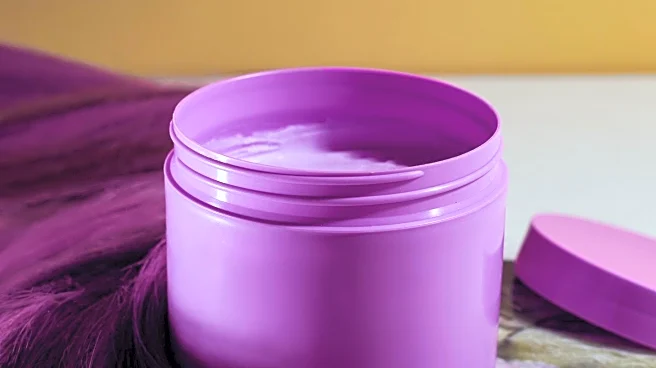What's Happening?
The beauty market is currently flooded with products claiming to enhance hair growth and volume, targeting individuals with thinning hair. These products include vitamins, scalp serums, and topical treatments,
which promise to thicken and grow hair faster. However, experts advise skepticism regarding these claims, as many products are classified as cosmetics rather than drugs, meaning their efficacy is not rigorously tested. Clinical trichologist Kate Holden highlights various factors affecting hair thickness, such as genetics, hormonal changes, and stress. Dermatologist Dr. Efe Kakpovbia recommends products like Olaplex and Aphogee for improving hair strength, while cautioning against relying solely on cosmetic serums for hair growth.
Why It's Important?
The scrutiny of hair-growth products is significant as consumers increasingly seek solutions for hair thinning and loss, often driven by stress and lifestyle factors. The market's saturation with products making unverified claims can lead to consumer skepticism and potential financial waste. While some products may offer temporary improvements in hair appearance, the lack of substantial clinical evidence supporting their efficacy raises concerns about misleading marketing practices. This situation underscores the need for more rigorous research and transparency in the beauty industry, impacting consumer trust and spending habits.
What's Next?
Consumers are advised to consult healthcare professionals, such as trichologists or dermatologists, for personalized advice on hair loss treatment. Over-the-counter topical medications like minoxidil, which have strong clinical backing, may be recommended for promoting hair growth. Additionally, prescription medications and therapies such as platelet-rich plasma therapy or low-level laser treatments could be considered for more severe cases. The beauty industry may face increased pressure to substantiate claims with scientific evidence, potentially leading to more stringent regulations and consumer advocacy.
Beyond the Headlines
The ethical implications of marketing unverified hair-growth products highlight the need for consumer protection and industry accountability. As consumers become more informed, there may be a cultural shift towards prioritizing scientifically-backed treatments over cosmetic solutions. This could influence the beauty industry's approach to product development and marketing strategies, fostering a more transparent and evidence-based market.










